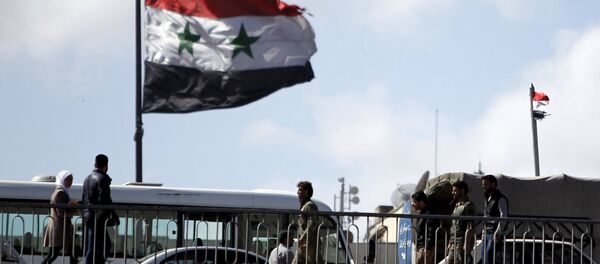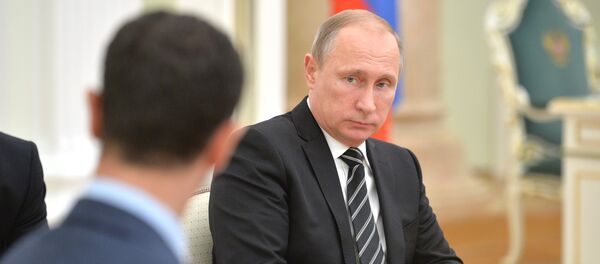The Syrian ceasefire came into effect on February 27 and has been largely holding since then; however, the truce remains a risky and fragile gamble, according to Pinak Ranjan Chakravarty, former Indian diplomat and prominent political analyst.
"In Syria and Iraq, the combination of State failure, civil war and the rise of IS [Daesh] has created the most serious crisis in the region. Regional and extra-regional powers have created such a mess that no cohesive approach in dealing with the IS could be developed. External powers funded and supported disparate groups, resulting in the rise of extremist Islamic jihadist militias that now have territory and revenues to expand their depredations in the region and beyond," Chakravarty narrates in his Op-Ed for The Telegraph India.
In contrast, Russia's involvement in Syria was the first tangible step in getting Syria out of the quagmire of the civil war.
The ceasefire agreement brokered by Washington and Moscow is supposed to pave the way for a political settlement. However, the truce has one important exception: Daesh and al-Qaeda's affiliate al-Nusra Front are not part of the ceasefire agreement and will continue to be targeted along with other terrorist groups. Given this, experts express doubts regarding the sustainability of the ceasefire.
The situation is complicated by the fact that Washington has seemingly no scruples about using al-Nusra Front as its proxy force against both Daesh and Syrian President Bashar al-Assad.
"This alliance of convenience, to fight both the Bashar al-Assad government and IS, has been the bedrock of US policy in Syria," Chakravarty remarks.
However, this approach did not work.
"American efforts to save al-Nusra Front from further punishment from Russian airstrikes did not succeed, again highlighting the irony of the US policy of supporting and protecting an affiliate of al-Qaeda in Syria," the diplomat underscores, adding that "Russia, Iran and Syria resolutely opposed the US' move and have continued to target al-Nusra Front and IS, as mandated by the UNSC resolution 2254 in December 2015."
Russia's engagement in Syrian has caught Washington by surprise. Now, Moscow's stance regarding the situation in Syria remains a stumbling block in the way of the US-led regime change project.
There is a possibility that US-Russian conflicting interests may also affect the truce, according to the Indian political analyst.
"There are still powerful, diehard cold warriors in the Barack Obama administration, particularly in the Central Intelligence Agency, who oppose diplomatic collaboration with Russia. They are itching to trip up Russia and ever-willing to repeat their historical baggage of intervention in Syria and other Arab countries," he stresses.
Thus unsurprisingly, Washington's hawks have jumped at the opportunity to pin the blame for the recent escalation of violence in Aleppo on Damascus.
"Syrian government forces are not the main reason of the current escalation [in Aleppo]. The true reason is provocations of terrorists who attempt to disrupt the ceasefire which was established February 27," Russian Foreign Ministry spokeswoman Maria Zakharova said during the latest press briefing.
"In Aleppo, there are areas controlled by the opposition and there are areas held by al-Nusra. That's our challenge, in part to make sure those lines are more clearly delineated, and we have conveyed that to the opposition," US Department of State spokesperson Mark Toner told journalists on Thursday.
At the same time, Washington is "not ready" to recognize the Syrian Jaysh al-Islam and Ahrar ash-Sham groups as terrorist organizations, although they share the same ideology as Daesh. Predictably, it is only adding insult to injury, threatening the fragile truce.
US policymakers are still clung to the idea that "Assad must go." In this light American thought leaders are seeking ways to convince Moscow to give up the legitimate Syrian government.
"Presumably Moscow could make it clear to its many contacts in the Syrian military and intelligence services that it is time for the family [Assad] to go. Presumably it could withdraw its military forces from Syria altogether. Would this be enough for a critical mass to form for Bashar's ouster?" Ambassador Frederic C. Hof, Resident Senior Fellow with the Atlantic Council's Rafik Hariri Center for the Middle East, notes in his latest article.
According to Hof, a reduction of violence "will make Assad squirm." In his eyes the truce is yet another chance for Syrians to reconsider their political preferences and turn their back on Bashar al-Assad.






